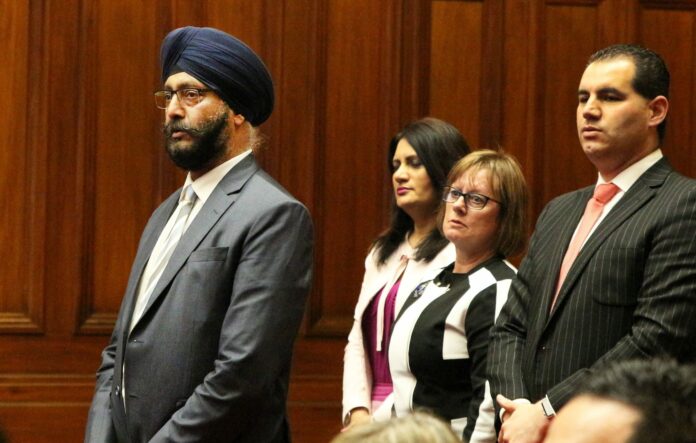A sudden change in the interpretation of how Immigration New Zealand makes decisions relating to partnership visas has been labelled racist and unjust. Laura Walters reports.
Indian migrants are angry at a sudden, and unexpected, change to the interpretation of immigration rules, which is barring their spouses from moving to New Zealand.
Newsroom has reported extensively on the delays in the processing of partnership category visas. Now, New Zealand residents and citizens, mostly from India and other South Asian countries, are having their visas processed.
But dozens, if not hundreds, of these partnership visa applications are being declined, as they don’t meet Immigration New Zealand’s (INZ) new interpretation of the partnership test.
These changes come under a Government that’s now making significant changes in immigration policy, after two years of continued strong migration and residency application that outstripped lowered targets.
But those in the Indian community are angry with the changes, with some being forced to sell up, pack up, quit their jobs and move back to India.
Others talk about hopelessness, financial and mental health issues, as well as stress put on new marriages and relationships.
And one immigration lawyer has labelled the sudden and unexpected change racist.
Change to pragmatic policy
Since 2009, following a ruling from the ombudsman, INZ has taken a somewhat pragmatic approach to granting partnership visas to those from India, who commonly engage in non-resident Indian (NRI) marriages.
These marriages are not the same as a traditional arranged marriage, but usually come about through a conversation between parents, extended families, and the parties looking to marry.
It isn’t uncommon for the pair to meet for the first time upon their engagement.
Those familiar with Indian culture, who spoke to Newsroom, said this was common practice, and did not reflect negatively on whether the relationship was genuine, or whether it would last.
However, it did create a difficulty for immigration officers applying the test to determine whether the partnership was “genuine and stable”.
Immigration instructions for partnership applications not only require INZ to determine whether the couple is genuine, and the relationship stable, but that the couple is “living together” in the same home at the time of the application.
This is often impossible for the sponsor partner who is working or studying in New Zealand.
While the New Zealand-based partner will often visit India for a few weeks or months at the time of the marriage and for brief holidays, it is often not possible to live with their new spouse long-term.
In the past, if INZ was not satisfied the couple had enough evidence to meet the relationship test, they would often grant a temporary visitor visa, which allowed the pair to live together in New Zealand, with the view to later apply for a partnership visa.
However, in the past fortnight, those applying for visas, and others working in the sector, say this workaround has been effectively removed as an option.
A stricter interpretation of immigration instructions is stopping those partners from gaining a temporary visitor visa, because they did not meet those specific tests, including having a strong enough incentive to return to their own country and prove their primary reason for travel was as a visitor.
While INZ said general short-term visitor visas would still be looked at on a case-by-case basis, those impacted say the approach from INZ has changed.
They say this more hardline interpretation of the instructions has left many from India, and other countries, with no path to joining their spouse.
While it’s hard to draw a trend from such a recent change in policy interpretation, the percentage of all approved applications for patrons of New Zealand residents or citizens was slightly down last month to 88.7 percent (from an average of 89.8 percent over the previous eight months). For applications where the applicant held an Indian passport, that approval percentage was at 77.4 percent last month (from an average of 91.2 percent over the previous eight months).
Policy ‘racist’, ‘Eurocentric’
Immigration lawyer Alastair McClymont said INZ was no longer looking for a pragmatic solution, and was instead strictly applying the policy.
He had written to senior managers at INZ and Immigration Minister Iain Lees-Galloway, but unless INZ changed its interpretation of how to apply its partnership tests, things weren’t looking good for applicants and their partners.
“I don’t know what to advise my clients either, I don’t know what they can do, apart from quitting their jobs, leaving their homes, selling up and going and living in India with their partner,” he said.
“This is why I’ve said that it is racist, at its core – it’s determining what kind of relationship someone can have. And it’s a European relationship, not an Indian relationship.”
“It’s really almost like saying: there is only one kind of partnership we recognise and that is a European, Kiwi-type marriage, and if you don’t enter into a relationship of that type, you can’t bring your partner to this country.”
The immigration instructions were “completely Eurocentric”, he said, adding that it sent a message that unless someone was married “the white, Kiwi way” they wouldn’t be able to get a visa.
“This is why I’ve said that it is racist, at its core – it’s determining what kind of relationship someone can have. And it’s a European relationship, not an Indian relationship.”
Since the change in policy a couple of weeks ago, McClymont’s practice has dealt with more than two dozen clients affected.
McClymont said while he was speculating, it was convenient the changes came at a time when INZ was under pressure to clear the massive backlog of partnership visa applications.
Last month, Newsroom reported New Zealand residents and their partners were suffering mental health issues, with some returning to India due to lengthy delays in visa processing.
High application volumes, coupled with the closure of offshore processing offices, had led to a massive backlog in the processing of partnership visa applications, particularly those coming from India.
In response, INZ has recruited more staff to its Mumbai and Hamilton offices, with 28 officers processing applications in Mumbai, and 140 in Hamilton working on partnership visa applications alone. INZ planned to expand to 170 in the coming months.
INZ business and specialist visa services national manager Peter Elms said INZ was working to provide certainty to applicants and their partners and was continuing with its recruitment drive.
Average visa processing times for partners of New Zealanders is currently nine months.
An angry community
While McClymont suggested the visa application backlog could be the driving force, National Party MP Kanwaljit Singh Bakshi said he believed it was an effort by the Government to curb immigration numbers.
While both New Zealand First and Labour campaigned on cutting immigration at the 2017 election, the number of people coming into New Zealand have remained high, and the number of people applying for residency was outstripping the Government’s lowered planning range.
“There is a lot of anger and people are frustrated.”
Bakshi said the Government needed to be upfront about plans to change immigration policy, and consult communities rather than making decisions from their Wellington offices.
The current approach from INZ showed a lack of sympathy, he said.
Bakshi was overseas when he got the call from his parents to tell them they had found him a good match.
The first time he met his wife was on their engagement, and they’ve been happily married for 30 years.
The latest changes to the INZ interpretation of the partnership instructions had caused worry within the Indian community, Bakshi said.
“There is a lot of anger and people are frustrated.”
INZ’s Elms said the department was mindful of cultural complexities and sensitivities when dealing with visa applicants.
“However, INZ must observe immigration policy as set by the Government.
“Immigration officers must consider all applications, regardless of the applicant’s background or country of origin, against the guidelines set out in immigration instructions,” he said.
“An immigration officer must be satisfied the applicant meets these instructions. It is also the responsibility of applicants to satisfy the immigration officer that the requirements of immigration instructions have been met.”
‘Our lives are on hold’
About a dozen people contacted Newsroom to share their experiences, many of whom had waited months to be assigned a case officer, only to have their applications declined within days.
Others had been declined multiple times.
Many of these people received the same reasoning from INZ: “We are not satisfied that you meet immigration instructions V3.10 as you have not demonstrated that you and your partner are living together in a genuine and stable relationship.”
While most who contacted Newsroom were from India, others had partners from Egypt or Thailand.
Ankur Shokeen married his wife in January and she applied for a partnership visa in February. Their case was assigned to an officer early last month, and declined three weeks later.
INZ told the pair while they had been married for 10 months, they had spent just a month together, and therefore did not meet the test.
Gagandeep and Jaspreet (who did not want their surnames used) were married last year and applied for a partnership visa in January, and after almost nine months of waiting to be assigned a case officer, their application was declined on the same day.
They WhatsApp for two hours every day, but have spent a total of five weeks together since their wedding.
Ehsanul (Sunny) Bashar married his wife in May 2016, and has had her visa application declined six times.
They have lived together for four months but that timeframe did not satisfy the requirement, and INZ said their partnership could not be categorised as “genuine and stable”.
Bashar is a New Zealand citizen, living in the country for 24 years, and said he believed this treatment was “unfair and unjust”.
“I wonder do we give up our jobs, our lives, desert our parents in New Zealand, face financial ruin? Is this what Immigration NZ wants?
“If there is a deliberate ploy to reduce numbers (of) migrants why have a policy where we can pay fees and apply for visas multiple times, to get the same negative result?
“Our lives are on hold, pained, traumatised, mentally and emotionally scarred,” he said.
Source - newsroom





























